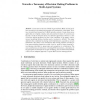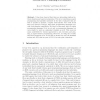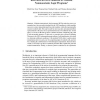144
click to vote
MATES
2009
Springer
15 years 8 months ago
2009
Springer
Abstract. Taxonomies in the area of Multi-Agent Systems (MAS) classify problems according to the underlying principles and assumptions of the agents’ abilities, rationality and i...
143
click to vote
MATES
2009
Springer
15 years 8 months ago
2009
Springer
Abstract. It has been observed that there are interesting relations between planning and agent programming. This is not surprising as agent programming was partially motivated by t...
137
click to vote
MATES
2009
Springer
15 years 8 months ago
2009
Springer
In constraint satisfaction, decomposition is a common technique to split a problem in a number of parts in such a way that the global solution can be efficiently assembled from th...
131
click to vote
MATES
2009
Springer
15 years 8 months ago
2009
Springer
Abstract. The formalization and use of experiences in good model design would make an important contribution to increasing the efficiency of modeling as well as to supporting the k...
120
click to vote
LPNMR
2009
Springer
15 years 8 months ago
2009
Springer
Abstract. We study the complexity of consistency checking and query answering on incomplete databases for languages ranging from non-recursive Datalog to disjunctive Datalog with n...
108
click to vote
LPNMR
2009
Springer
15 years 8 months ago
2009
Springer
CR-Prolog is an extension of A-Prolog, the knowledge representation language at the core of the Answer Set Programming paradigm. CR-Prolog is
105
Voted
LPNMR
2009
Springer
15 years 8 months ago
2009
Springer
We consider random logic programs with two-literal rules and study their properties. In particular, we obtain results on the probability that random “sparse” and “dense” pr...
LPNMR
2009
Springer
15 years 8 months ago
2009
Springer
Modular nonmonotonic logic programs (MLPs) under the answer-set semantics have been recently introduced as an ASP formalism in which modules can receive context-dependent input fro...
107
Voted
LPNMR
2009
Springer
15 years 8 months ago
2009
Springer
Circumscription is one of the most important formalisms for reasoning with incomplete information. It is equivalent to reasoning under the extended closed world assumption, which a...
LPNMR
2009
Springer
15 years 8 months ago
2009
Springer





